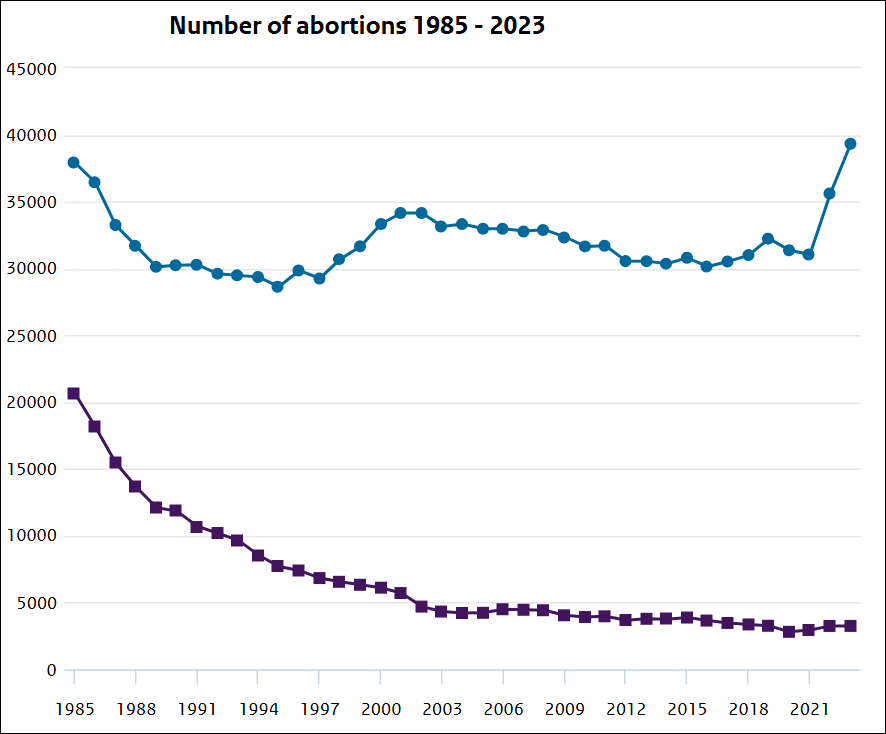
The Lower House wants the government to investigate whether abolishing the mandatory reflection period before approving an abortion has contributed to the recent increase in the number of abortions. A majority of the parliamentary groups also want to bring forward the evaluation of the Termination of Pregnancy Act. Several professional associations, including that of abortion doctors, fear that these investigations aim to lead to reduced access to abortion care.
A GP from Amsterdam, MJP Kruiger, sent this comment in reply on 4 March 2025:
A radical idea; but if we want fewer abortions, shouldn’t we simply make contraception fully and freely accessible to all women again? And perhaps doctors from our profession would also give a little more pushback against all that misinformation going around about how ‘bad’ hormones are for you? You know, those weird influencer stories that you are bombarded with on social media? Or am I the only GP who is surprised that so many young women are suddenly promoting ‘natural’ contraception (read: Russian roulette with the Mayan calendar on a trendy app…)?
SGP Member of Parliament Diederik van Dijk had submitted a motion to investigate whether the abolition of the mandatory reflection period as of 1 January 2023 has contributed to the increase in the number of abortions. This was supported by the following parties: NSC, ChristenUnie, SGP, BBB, CDA, PVV and Forum voor Democratie. The motion on an early evaluation of the Termination of Pregnancy Act came from NSC MP Ria de Korte, and was supported by Denk, NSC, ChristenUnie, SGP, CDA, BBB and PVV, among others.
Another motion by the SGP MP was not adopted. He proposed to have ‘the factors and motives for an abortion (request)’ registered in future and to have this information, aggregated and anonymous, published annually by the Health Care Inspectorate. This motion was voted on by roll call, with only 15 of the 147 MPs present voting in favour.
The reason for the three motions is an increase in the number of abortions since 2022. While the number of abortions in 2012 fluctuated between 30,000 and 33,000 per year, the total rose to over 39,000 in 2023.
Gynaecologists and abortion doctors advised against the motions
The Dutch Society for Abortion Doctors (NGvA) had advised against the motions in the run-up to the vote. On 28 February, the NGvA stated in a letter to the members of the House of Representatives:
‘There is no indication that the abolition of the mandatory deliberation period has led to an increase in the number of abortions. Additional research adds nothing and wastes time and money… ‘We see in other countries how reproductive rights are being restricted step by step, often under the guise of registration and so-called neutral regulations. And the gynaecologists’ association NVOG recently posted the statement on its website that ‘an investigation into the reasons for abortion is unnecessary and undesirable’. ‘It suggests a duty of accountability and increases the risk of stigmatisation and reduced access to care.’ The Rutgers Foundation, which advocates for women’s rights, also stated that the three motions could restrict access to abortion care.
In a plenary parliamentary debate on 20 February, VWS State Secretary Vincent Karremans (VVD, Youth, Prevention and Sports) also advised against all three motions. He indicated that the planned evaluation of the Termination of Pregnancy Act in 2027 will take into account the effects of abolishing the mandatory deliberation period and the prescription of the abortion pill by general practitioners.
Several charts and graphs provided along with this report show fluctuations in numbers over time that do not clearly indicate any sudden rise in numbers. Here they are:
Terminations of pregnancy among foreign women remain the same
In 2023, a total of 39,332 abortions were performed in the Netherlands. Of these, 3,261 were women categorised as foreign. That is 3 more than in 2022. The share of foreign women in the total number of abortions is therefore 8.3%. That is 0.9% less than in 2022.
Most abortions occur in the first 8 weeks
In 2023, 87% of abortions occurred in the first trimester (up to 13 weeks of pregnancy). 13 percent of abortions occurred in the second trimester (from 13 weeks). Of all abortions, 69% occurred in the first 8 weeks.
Terminations of pregnancy in teenagers
In 2023, there were 2,890 abortions in teenagers up to the age of 20. Of these, 2,783 took place in the age group 15 to 19 years. And 107 in teenagers younger than 15 years.
Since 2002, we have seen a slow decline in the number of abortions among teenagers. In 2019, this number rose for the first time in years compared to the previous year. In 2023, 2,890 abortions took place among teenagers. That is 188 more than in 2022.
Most abortions occurred in women aged 30 to 35, followed shortly by women aged 25 to 30.
SOURCE: https://www.igj.nl/over-ons/igj-in-cijfers/cijfers-zwangerschapsafbreking



